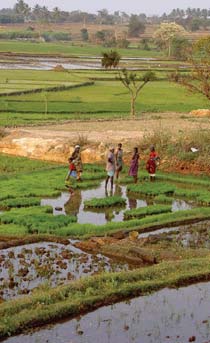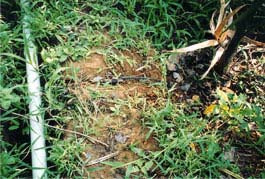/topics/lifestyle
Lifestyle
Social equity and integrated water resources management – A background paper by Global Water Partnership
Posted on 31 Aug, 2011 04:10 PMIt provides an analytical framework that policy makers and water professionals can use to bring greater clarity to the issue of social equity in their local context.
Adaptive water resource management in the Lower Bhavani project command area in Tamil Nadu – A research report by IWMI
Posted on 25 Aug, 2011 11:07 PM
To what extent farmers and water resource managers already practice adaptive management and whether it is practiced in an optimal manner or could there be areas for improvement based on recent advancements in the theory of adaptive management are some of the questions that are particularly appropriate in the light of rapid changes in river basin water use and also in relation to basin closure.
This paper draws on the development and use of water resources in the Lower Bhavani Project (LBP), with the LBP reservoir and the 84,000 hectare (ha) LBP command area. The project diverts water from the Bhavani River, a tributary of the Cauvery River in Tamil Nadu.
Boundary concepts for interdisciplinary analysis of irrigation water management – A working paper by Peter Mollinga
Posted on 24 Aug, 2011 07:16 PMThe focus is concepts that capture the hybridity of irrigation systems as complex systems, and cross the boundaries of the natural and social sciences.
The relevance of traditional knowledge for health, well being and sustainable development - Indian Journal of Traditional Knowledge
Posted on 22 Aug, 2011 12:27 PMThis paper published in the journal Indian Journal of Traditional Knowledge is an attempt to discuss the traditional knowledge of elderly people, their role and highlights many areas w
Plants used as agricultural seasons indicator by Mao Naga tribe - Manipur (India) - Indian Journal of Traditional Knowledge
Posted on 21 Aug, 2011 07:38 PMAgriculture is the main occupation of the tribe and they have a unique way of knowing plantation season for different crops by observing the flowering of some plants. The indicator plants are peach, wild cherry, camel foot and dancing girl.
Indigenous knowledge of soil fertility management in the humid tropics of Arunachal Pradesh - Indian Journal of Traditional Knowledge
Posted on 21 Aug, 2011 05:28 PMThis paper published in the Indian Journal of Traditional Knowledge highlights the findings of a study that correlates the indigenous knowledge and scientific knowledge in assessing the nutrient availability status of agricultural soil as practised by the Nyishi tribes who use visual properties such as colour, texture and topographic positioning of land/terrain.
Malaria control manual - Guidance for malaria control projects in humanitarian situations - Published by OXFAM
Posted on 20 Aug, 2011 10:32 PMThis manual on the Eldis site published by OXFAM provides guidance to public health promoters, water and sanitation engineers, project co-ordinators
Draft of Land Acquisition and Resettlement & Rehabilitation Bill, 2011 in public domain - Comments invited by Ministry of Rural Development till 31st August, 2011
Posted on 15 Aug, 2011 05:35 PMGuest post by: Amita Bhaduri
The drafting of a new legislation on these issues was taken up by a Group of Ministers in May 2007 and this is the second draft bill presented by the UPA Government.
Toilet manure in organic farming – An article by Varanashi Research Foundation
Posted on 12 Aug, 2011 03:45 PM Human faeces and urine (toilet manure) are a serious waste disposal problem especially in areas with high human population density. At the same time they are rich in nutrients that are essential to plants.
Human faeces and urine (toilet manure) are a serious waste disposal problem especially in areas with high human population density. At the same time they are rich in nutrients that are essential to plants.
The challenges of ecological sanitation in coastal south India - A case study of Kovalam town - South Chennai (Tamil Nadu) - A presentation
Posted on 11 Aug, 2011 05:48 PMThis presentation by Sekhar Raghavan, Director, Rain Centre, Chennai, India highlights the experiences and the challenges faced by Rain Centre in introducing ecological sanitation in the coastal town of Kovalam near Chennai, Tamil Nadu, India along with Coastal and Rural development Trust (CRDT), a small non profit centre based in Kovalam .
The coastal town of Kovalam was selected as a case because of its peculiar situation with its location in a fast developing peri-urban area in proximity to Chennai city characterised by good groundwater situation, adequate land and housing facilities, but with a glaring and urgent need and demand for toilets.





